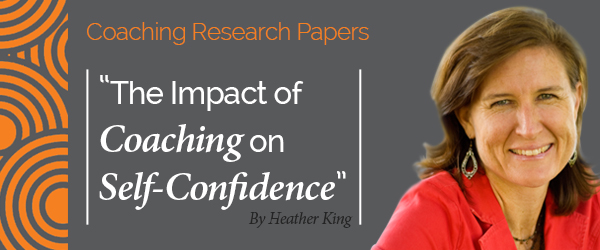Research Paper By Heather King
(Executive Coach, INDIA)
Without self-confidence we are as babes in the cradle. (Virginia Woolf)
Introduction
The intent of this paper is to research the importance of self-confidence and how it can be improved through the coaching process. If self-confidence is essential, or at least very instrumental, to a person’s ability to move forward, then it is important that coaches learn to recognize low levels of confidence in their clients and learn how to support them in building their confidence.
What does Confidence Mean?
A common thread in many of the definitions of confidence is trust and belief. The Merriam-Webster Dictionary online, defines confidence as
a feeling or consciousness of one’s powers or reliance on one’s circumstances; faith or belief that one will act in a right, proper, or effective way.
Dictionary.com defines it as
full trust; belief in the powers, trustworthiness, or reliability of a person or thing.
This paper will focus specifically on confidence in oneself or self-confidence. This confidence transcends what a person knows and does.
True confidence has nothing to do with what is happening in your outer life. True confidence isn’t created because of what you do, but because of your belief in the ability you have within to do anything you want to. (DeAngelis, 1995, pg. 11)
When people base their confidence on what they can do well, they only feel confident when they are doing those activities. Therefore, a person is truly confident when they believe they have the ability to find the answers, resources, and/or skills they need to handle whatever life brings their way, and handle it well.
At it’s heart, confidence is the ability to take appropriate and effective action in any situation, however challenging it appears to you or others. (Burton, & Platts, 2006, pg. 10).
Why do we need Self-Confidence?
Without confidence, a person perceives their world as dangerous. They fear that that they cannot handle a situation or they that they are being judged negatively in some way. When a person feels threatened, their internal alarm system is activated. Confidence can deactivate those unnecessary alarms.
By recognizing that we can handle situations and not fear other peoples’ judgments, our world is safe. Our greatest resource is confidence, and carrying it with us at all times is our ticket to success. (Sokol & Fox, 2009, pg. 146).
A confident person is able to recognize their assets and strengths. They are competent and tend to achieve more. They are free of anxiety and depression. They no longer are wasting energy on their self-doubt, debilitating feelings, and problems, but they can use their energy for the common good. (Hankin, 2008) This peacefulness allows them to see difficult situations as opportunities to grow instead of as problems.
Confidence allows people to enjoy life and handle it with ease.
Genuine self-confidence will bring you fulfillment and serenity, while allowing you to enjoy kinder, more loving relationships. It is a feeling of freedom to live outside of a critical, fearful brain in a world you can fully appreciate. (Hankin, 2008, p. 54)
When people are able to trust and comfort themselves in a challenging situation they are able to think more clearly and come up with solutions with greater ease. People who have low self-confidence, on the other hand, are more likely to be stuck in their self-doubt and unable to move forward. This can lead to even lower levels of self-confidence and perpetuate the cycle. Confident people are calm, energetic, moving forward, and powerful. They see themselves as a part of others and are acknowledging and grateful. (Confidence, ICA module Level 1)
Does coaching improve confidence?
There are a number of studies that demonstrate that coaching has indeed been successful at improving a client’s self-confidence. In 1997, one of the first empirical studies on the outcomes of executive coaching was conducted. Twenty-five executives were interviewed to gain information on their learning experience from being coached. Eighty-four percent of those interviewed indicated positive feelings about their involvement in coaching. In addition, twenty-four percent specifically reported that they had experienced greater personal growth as well, such as becoming more open to change and having greater self-confidence. (Feldman & Lankau, 2005)
